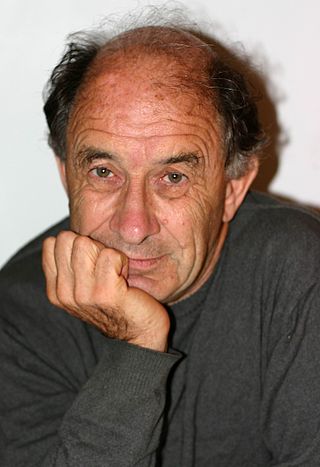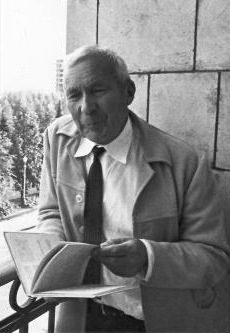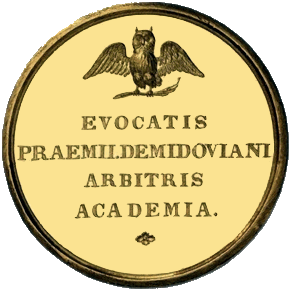
Vladimir Igorevich Arnold was a Soviet and Russian mathematician. He is best known for the Kolmogorov–Arnold–Moser theorem regarding the stability of integrable systems, and contributed to several areas, including geometrical theory of dynamical systems theory, algebra, catastrophe theory, topology, real algebraic geometry, symplectic geometry, symplectic topology, differential equations, classical mechanics, differential geometric approach to hydrodynamics, geometric analysis and singularity theory, including posing the ADE classification problem.

Andrey Nikolaevich Kolmogorov was a Soviet mathematician who contributed to the mathematics of probability theory, topology, intuitionistic logic, turbulence, classical mechanics, algorithmic information theory and computational complexity.

Leonid Anatolievich Levin is a Soviet-American mathematician and computer scientist.
The Pushkin Prize was a Russian literary award presented to a Russian writer considered to have achieved the highest standard of literary excellence. It was established in 1881 by the Russian Academy of Sciences to honor one of the greatest Russian poets Alexander Pushkin (1799–1837), then discontinued during the Soviet period. It was restored in 1989 by Alfred Toepfer Foundation in Hamburg. In 1995, the State Pushkin Prize was established by Boris Yeltsin's decree, with Vladimir Sokolov being the first laureate. Both lasted till 2005. In 2005 the New Pushkin Prize was established by the Aleksander Zhukov Fund, as well as the Pushkin and Mikhaylovskoye museums. In 2017 the International Creative Contest "World Pushkin" was established by the Russkiy Mir Foundation and the A. Pushkin State Literary Memorial and Natural Museum-Reserve Boldino.
Boris Vladimirovich Gnedenko was a Soviet mathematician and a student of Andrey Kolmogorov. He was born in Simbirsk, Russia, and died in Moscow. He is perhaps best known for his work with Kolmogorov, and his contributions to the study of probability theory, particularly extreme value theory, with such results as the Fisher–Tippett–Gnedenko theorem. Gnedenko was appointed as Head of the Physics, Mathematics and Chemistry Section of the Ukrainian Academy of Sciences in 1949, and became Director of the NASU Institute of Mathematics in 1955.

Yakov Grigorevich Sinai is a Russian–American mathematician known for his work on dynamical systems. He contributed to the modern metric theory of dynamical systems and connected the world of deterministic (dynamical) systems with the world of probabilistic (stochastic) systems. He has also worked on mathematical physics and probability theory. His efforts have provided the groundwork for advances in the physical sciences.

Albert Nikolayevich Shiryaev is a Soviet and Russian mathematician. He is known for his work in probability theory, statistics and financial mathematics.
The Kurchatov Medal, or the Gold Medal in honour of Igor Kurchatov is an award given for outstanding achievements in nuclear physics and in the field of nuclear energy. The USSR Academy of Sciences established this award on February 9, 1960 in honour of Igor Kurchatov and in recognition of his lifetime contributions to the fields of nuclear physics, nuclear energy and nuclear engineering.

The MSU Faculty of Mechanics and Mathematics is a faculty of Moscow State University.

The Demidov Prize is a national scientific prize in Russia awarded annually to the members of the Russian Academy of Sciences. Originally awarded from 1832 to 1866 in the Russian Empire, it was revived by the government of Russia's Sverdlovsk Oblast in 1993. In its original incarnation it was one of the first annual scientific awards, and its traditions influenced other awards of this kind including the Nobel Prize.
The Lobachevsky Prize, awarded by the Russian Academy of Sciences, and the Lobachevsky Medal, awarded by the Kazan State University, are mathematical awards in honor of Nikolai Ivanovich Lobachevsky.

The Moscow Mathematical Society (MMS) is a society of Moscow mathematicians aimed at the development of mathematics in Russia. It was created in 1864, and Victor Vassiliev is the current president.

The State Prize of the Russian Federation, officially translated in Russia as Russian Federation National Award, is a state honorary prize established in 1992 following the breakup of the Soviet Union. In 2004 the rules for selection of laureates and the status of the award were significantly changed, making them closer to such awards as the Nobel Prize or the Soviet Lenin Prize.
The William I. Fine Theoretical Physics Institute is a research institute in the University of Minnesota College of Science and Engineering. FTPI was largely the work of physics Professor Emeritus, Stephen Gasiorowicz and university alumnus and Twin Cities real-estate developer William I. Fine. The institute officially came into existence in January 1987. FTPI faculty consists of six permanent members: Andrey V. Chubukov, Alex Kamenev, Keith Olive, Maxim Pospelov, Mikhail Shifman, and Boris Shklovskii. The institute has on Oversight Committee consisting of ten members. The Oversight Committee is the board of directors that make decisions concerning the staffing and budgeting of the institute.

The Landau Gold Medal is the highest award in theoretical physics awarded by the Russian Academy of Sciences and its predecessor the Soviet Academy of Sciences. It was established in 1971 and is named after Soviet physicist and Nobel Laureate Lev Landau. When awarded by the Soviet Academy of Sciences the award was the "Landau Prize"; the name was changed to the "Landau Gold Medal" in 1992.
Kovalevskaya Prize is a national scientific prize awarded by Russian Academy of Sciences for outstanding achievements in mathematics since 1997 in honor of Sofya Kovalevskaya.
Vladimir Igorevich Bogachev is an eminent Russian mathematician and Full Professor of the Department of Mechanics and Mathematics of the Lomonosov Moscow State University. He is an expert in measure theory, probability theory, infinite-dimensional analysis and partial differential equations arising in mathematical physics. His research was distinguished by several awards including the medal and the prize of the Academy of Sciences of the Soviet Union (1990); Award of the Japan Society for the Promotion of Science (2000); the Doob Lecture of the Bernoulli Society (2017); and the Kolmogorov Prize of the Russian Academy of Sciences (2018).
Andrey Albertovich Muchnik was a Soviet and Russian mathematician who practiced mathematical logic. He was awarded the A. N. Kolmogorov Prize in 2006.









